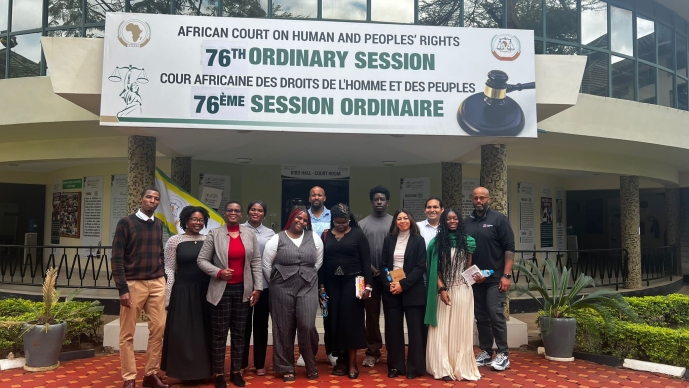Embedded Spring: Rutgers-Tanzania and Zanzibar: Indigenous Communities Field Study
The Program
The International Leadership Exchange is a community engaged learning initiative that prepares undergraduates to be leaders of nonprofit and public organizations. Through the integration of course readings, classroom discussions, lectures and community engaged learning projects, this dynamic field-study challenges participants to broaden their theoretical and practical understanding of community, nonprofit and public organizations committed to sustainable living, education, public health and community wellness. This unique course is designed to challenge students to become community engaged social change agents and competitive professionals in culturally complex spaces.
Exploring the dynamic regions of Tanzania and Zanzibar, this 3-credit field study course allows students to critically examine the inner workings of a unique group of urban public organizations striving for social change. In preparation for travel, students will garner a stronger understanding of the theoretical foundations surrounding international social work in the Global South. Students will travel in May 2026 for 13 days to complete the field study component of the course. In the field, students will engage with the African Court on Human and Peoples’ Rights, the International Criminal Tribunal Court, the Maasai community, local schools, and businesses. There will also be opportunities for cultural and historical tours to UNESCO World Heritage sites in Tanzania and Zanzibar.

Program Locations
Tanzania
Arusha
Arusha is a city in northern Tanzania, located at the base of Mount Meru. The city is known as the safari capital, serving as a gateway to Serengeti, Ngorongoro, and Kilimanjaro. Arusha is also a diplomatic center, hosting the East African Court of Justice, African Court on Human and Peoples’ Rights, the International Criminal Tribunal Court, and more.
Zanzibar
Stone Town
Stone Town is the historic heart of Zanzibar City, known for its narrow alleys, coral stone buildings, and rich Swahili culture. Acknowledged as a UNESCO World Heritage Site, Stone Town reflects a blend of African, Arab, Indian, and European influences, and is famous for its vibrant markets, historic sites, and coastal charm.
Academics
This course is offered through the Department of Social Work at Rutgers University - Newark under the course code 21:910:347 and can be used to satisfy elective credits towards our Social Welfare Minors. The curriculum is designed to address the nine Social Work Core Competencies developed by the Council on Social Work Accreditation (CSWE) and outlined in the 2022 Educational Policy and Accreditation Standards (EPAS). These core competencies include:
- Demonstrate Ethical and Professional Behavior
- Advance Human Rights and Social, Racial, Economic, and Environmental Justice 3. Engage Anti-Racism, Diversity, Equity, and Inclusion (ADEI) in Practice
- Engage in Practice-Informed Research and Research-Informed Practice 5. Engage in Policy Practice
- Engage with Individuals, Families, Groups, Organizations, and Communities 7. Assess Individuals, Families, Groups, Organizations, and Communities
- Intervene with Individuals, Families, Groups, Organizations, and Communities 9. Evaluate Practice with Individuals, Families, Groups, Organizations, and Communities
Curriculum also responds to the core values of the Social Work profession as outlined by the National Association of Social Workers (NASW), including:
- A focus on providing Service;
- Attention to issues of Social Justice and addressing social injustice;
- Recognition of the Dignity and Worth of the Person;
- Recognition of the Importance of Human Relationships;
- A commitment to act with Integrity; and,
- Competence
Additionally, primary objectives of this course include:
- Helping students recognize that cultural celebration is an ongoing and necessary for competent of effective and ethical practice;
- Helping students develop self-awareness of their own privilege, power, oppression, or disenfranchisement and how these can affect their work with clients and communities from similar and dissimilar backgrounds;
- Helping students increase their cross-cultural knowledge of the history, traditions, values, family systems, artistic expressions, etc. of other cultural groups;
- Teaching students a broad range of skills and techniques for working with diverse groups within micro, mezzo, and macro contexts;
- And, helping students learn how to communicate more effectively across diversity and potential challenges, including language differences and means of communication (reading, writing, speaking).
While this course is open to all students, Social Work Majors are eligible to receive up to 60 hours towards their Senior Practicum internship. This internship component is supervised by the Department of Social Work Practicum Director, Prof. Lana Church, and includes a pre-trip meeting to discuss the Practicum Learning Contract, which must be signed by students looking for practicum credit; 1-hour of supervision per week during the trip; and, the submission of a timesheet documenting adherence to the learning contract objectives following the completion of travel. A sample learning contract is included at the end of this application.
Housing and Meals
Students will stay in hotels and an eco-resort with double occupancy rooms. Meals include breakfast, lunch, and dinner.
Financial Information
Program Costs
| Program Cost | |
|---|---|
| All students | $1,000 |
Program Cost includes:
• Housing
• Airfare
• Most meals
• Excursions
• Administrative Fees
• Emergency Medical Access Abroad
- Students will need to register in a 3 credit course. Tuition for this course is not included in the program price.
Out-of-Pocket Costs
| Multiple Entry Visa | $100 |
| Additional Meals | $50 |
| Personal Expenses | $150 |
| Total | $300.00 |
Out-of-Pocket Cost includes:
The above costs are estimations and represent the known out-of-pocket costs students encounter during their time abroad.
Some of these expenses will be paid for prior to going abroad, such as an airline ticket and visa costs, while some of these expenses, such as meals and local transportation, will be paid in-country as part of your daily expenses. As you plan, you will need to budget these costs and spend wisely throughout your time abroad.

